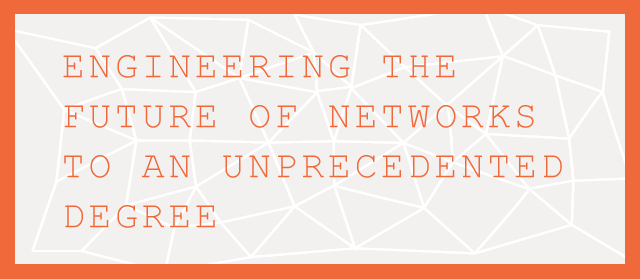
To earn a Bachelor of Science in Engineering from Penn, you’ll draw upon the physical, economic, computer and social sciences, as well as mathematics and engineering. You will also launch a profoundly integrated yet specialized program for this rapidly developing field.
Foundational courses in mathematics like calculus, linear algebra and probability join the basics of engineering with programming, algorithms and stochastic systems analysis. These and more underlie the program’s core classes.
Ultimately, NETS students must acquire a versatile mastery of traditional computer science and systems engineering and economics, as well as study the sociological implications of life in the digital age.
NETS is an intensive four-year program that requires acceptance to both to the University of Pennsylvania and the NETS program itself.
Besides the five Networked & Social Systems engineering core courses, degree holders will complete credits in engineering, mathematics and natural science, microeconomics and game theory, and electives in ethics, writing, humanities, social science and more, all capped by a one-year Senior Design project or a research-based Senior Thesis.
Networked and Social Systems Engineering
Typical Course Plan – Student with no AP
Freshman Fall
|
Junior Fall
|
Freshman Spring
|
Junior Spring
|
Sophomore Fall
|
Senior Fall
|
Sophomore Spring
|
Senior Spring
|
Example Depth Electives
DEPTH AREA "C": NETWORKED AND CLOUD SERVICES
- CIS 2330 Intro to Blockchain
- CIS 3310 Intro to Networks and Security
- CIS 3340 Advanced Algorithms
- CIS 3500 Software Design/Engineering
- CIS 4500 Database and Information Systems
- CIS 4550 Internet and Web Systems
- CIS 5530 Networked Systems
- NETS 2130 Crowdsourcing and Human Computation
DEPTH AREA "D": DATA SCIENCE
- CIS 4210 Artificial Intelligence
- CIS 5200 Machine Learning
- CIS 5220 Deep Learning for Data Science
- CIS 5300 Computational Linguistics
- CIS 5450 Big Data Analytics
- STAT 4710 Modern Data Mining
- STAT 4760 Applied Probability Models in Marketing
DEPTH AREA "T": THEORY OF NETWORKS & DYNAMICS
- ESE 4200 Agent-Based Modeling and Simulation
- ESE 5000 Linear Systems Theory
- ESE 5010 Networking Theory and Fundamentals
- ESE 5050 Feedback Control Systems
- ESE 6050 Modern Convex Optimization
- OIDD 9150 Advanced Graph Theory
- OIDD 9340 Dynamic Programming and Stochastic Models
DEPTH AREA "E": ECONOMICS AND NETWORKED MARKETS
- EAS 5450 Engineering Entrepreneurship I
- EAS 5460 Engineering Entrepreneurship II
- ECON 6100 Microeconomic Theory
- ECON 6110 Game theory and its Applications
- ESE 4000 Engineering Economics
- MKTG 2700 Digital Marketing, Social Media, and E-Commerce
- MKTG 7680 Contagious: How Products, Ideas and Behaviors Catch On
- OIDD 3190 Advanced Decision Systems: Evolutionary Computation
- OIDD 9000 Foundations of Decision Processes
- OIDD 9040 Experimental Economics
DEPTH AREA "S": TECHNOLOGY AND SOCIETY
- COMM 4410 The Impact of the Internet, Social Media, & Information Technology on Democracy
- COMM 4590 Social Networks and the Spread of Behavior
- SOCI 3200 Field Methods of Sociological Research
- SOCI 3210 Sample Survey Methods
- SOCI 5350 Quantitative Methods I
- SOCI 5351 Quantitative Methods II





